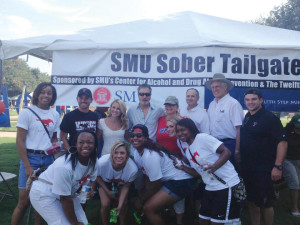
Many subscribe to the notion that college is or was some of the best years of one’s life. Often, and especially at SMU, this sentiment is synonymous with partying. Boulevarding, seemingly-infinite frat parties and 21st birthday celebrations are associated with the “best” of college times. But, for students in recovery from alcohol and drug abuse, this can be incredibly difficult to navigate.
SMU’s Recovery Program is working to reverse this common miscommunication, and is one school leading a movement to create an integrative, open community within the university rather than separate from it.
Jan McCutchin, director for the SMU Recovery programs, said the goal is to “provide the support that students in recovery need to have success” without interrupting their opportunities “education-wise and personally.”
One of the more cutting-edge concepts that SMU has adopted is one of a sober tailgate – an alcohol-free tent across from McFarlin Auditorium and the fountain.
“We have a lot of students who are in recovery who do not go to the Boulevard because they are not drinking anymore,” McCutchin said. “They feel it’s something that needs to be skipped.”
McCutchin and her colleagues disagree, and have worked to create a safe alternative for those in recovery that will allow them to “experience college as a
college student.”
“[The Sober Tent] is not to recruit students, it’s not to do anything but just celebrate a non-drinking atmosphere,” McCutchin said. “Our goal…is to provide a place for students who are making the choice not to drink…to meet each other…and be a part of the tailgating experience in a manner that is safe for them.”
The tent features a vast spread of food and entertainment, and is open to everyone on the Boulevard looking for an alcohol-free environment.
Beyond provisions at football games, the AA program at SMU — for both alcohol and drug abuse — is one that offers unique opportunities not only for recovery, but for mentoring and networking as well. The “inclusive, 12-step meeting” each week is now an open process.
“We are inviting faculty and staff also in recovery to attend [weekly meetings] and mentor students, and vice versa,” McCutchin said.
She said this allows the program to “be far more inclusive to the university community.”
McCutchin said because many faculty and staff in recovery “are already established within the AA community,” SMU Recovery programs are able to take advantage of work already being done and “really promote it toward SMU.”
“We’re hoping to gain resources, contacts and individuals who are doing things in recovery,” McCutchin said. “[This will allow] a networking relationship among faculty, staff, and students.”
SMU senior Shannon Delehanty, a participant in SMU’s recovery programs, said that by “providing support for those struggling with addiction or in recovery,” the university is demonstrating that it “cares greatly about its students.”
“[SMU programs] make it possible for those individuals to live a better life,” Delehanty said. “I personally got in trouble a couple of years ago for alcohol and didn’t know any alternatives.” By instituting things like the sober tent, SMU is giving substitute “activities that don’t involve drinking while getting a
great education.”
“I think one of the biggest misconceptions is that you can’t have fun without drinking,” Delehanty said.
“SMU is stepping in the right direction toward changing people’s perspectives,” McCutchin said. And as other universities and students nationally have grown more invested in recovery programs, many have taken notice of SMU’s dynamic offerings, McCutchin explained.
“[Growing national interest and need] has been a real motivator in getting these programs established so students want to come to SMU,” McCutchin said. “This is a great recruitment and retention opportunity for our school.”










